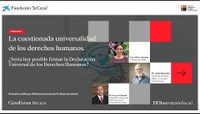Questioning the Universality of Human Rights
Available in video:
Would it be possible to sign the Universal Declaration of Human Rights today?
The Universal Declaration of Human Rights was adopted in 1948 in a moment when the UN was composed of 58 states. The transformations of the world, with 193 states as members of the United Nations today, have led to the questioning of the universal nature of human rights based, above all, on the cultural differences that are increasingly present on the global agenda.
With the participation of:
- Jack Donnelly, Andrew Mellon Professor in the Josef Korbel School of International Studies and Distinguished University Professor at the University of Denver
- Surya P. Subedi, Professor of International Law, University of Leeds
Chaired by Miriam Bradley, Associate Professor at IBEI
Practical information
🎙️ Language: Catalan, Spanish and English with simultaneous translation
📍 Venue: Sala d’Actes, CaixaForum Macaya, Passeig de Sant Joan, 108, 08037 Barcelona · Google Maps
✏️ Attendance is free, previous registration is required.
📄 Those who attend the whole series of conferences can request an attendance and achievement diploma delivered by the Observatori Social de la Fundació "la Caixa" and IBEI.
Roundtable Series: Human Rights Today
The universality of human rights is increasingly questioned. The redistribution of power in international society has given renewed assertiveness to actors such as China, Russia and some Southern states, who criticize the Universal Declaration of Human Rights for being too Western-centric. It would probably not be possible today to sign the Universal Declaration of Human Rights, as happened in 1948 after World War II at the instigation of a group of Latin American countries.
This roundtable series co-organized with The Social Observatory - "la Caixa" Foundation series seeks to address the growing questioning of the Universal Declaration of Human Rights, as well as the current situation of some of them, such as the human rights of migrants, children, and women in conflict.
Agenda
- April 26, 18:00 CEST | Questioning the Universality of Human Rights
- May 3, 18:00 CEST | The Human Rights of the Child
- May 10, 18:00 CEST | Women's Human Rights and Sexual Violence in Conflict
- May 17, 18:00 CEST | Human rights on the move




